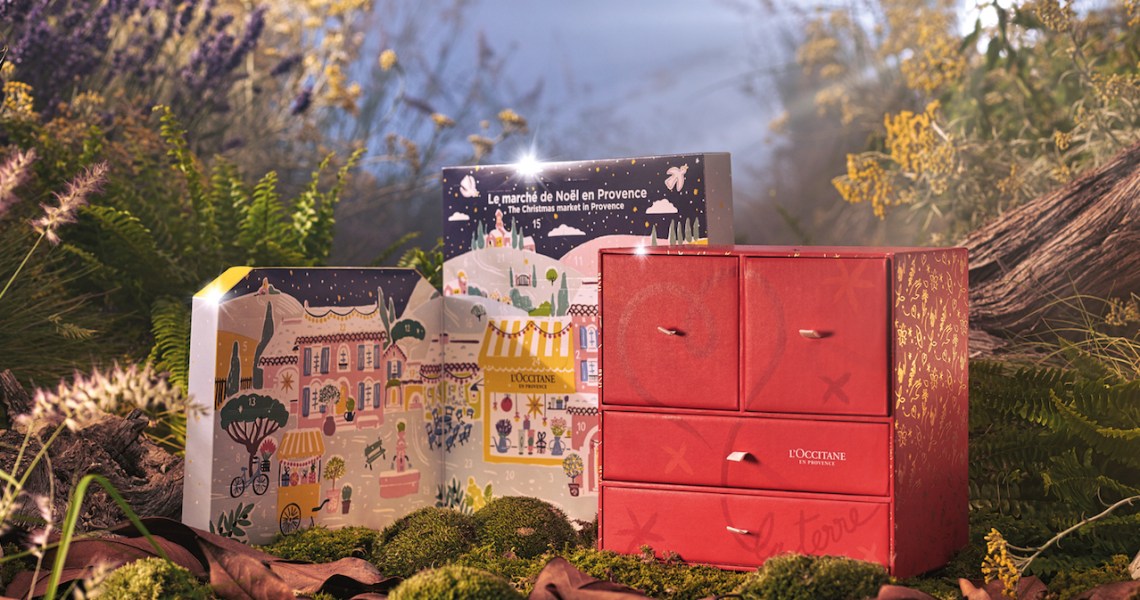Typically, beauty presents under the Christmas tree are just about as ornate and festive as they can be, but companies are trying something different this holiday.
Brands have accelerated their sustainability plans or introduced sustainability into their brand ethos this year, and the holiday season is providing glimpses into its plans for 2021. For example, for its holiday assortment, L’Occitane en Provence introduced molded paper pulp trays to replace the plastic ones that keep products in place. It also introduced 95% post-consumer recycled aluminum into its tubes for products like hand creams.
L’Occitane en Provence eliminated plastic wrap on products during the 2019 holiday season, but this year went further by impacting the products and primary packaging themselves. Its holiday lineup includes approximately 40 items, including two advent calendars that use the molded paper pulp. Plastic trays were also removed from individual item packages. Corinne Fugier-Garrel, L’Occitane’s packaging concept director, said these two switches alone save L’Occitane from using 28 tons of plastic for the holidays.
Fugier-Garrel sais L’Occitane had to work with new, undisclosed suppliers to make the molded paper pulp tray, including those that have traditionally worked with food brands. L’Occitane also had to confirm the material was suitable for global transit and would not wilt or dissolve in humidity, for example.
“We are [small] compared to their [food] clients, so they were not interested in us at all. We had to convince them that it was good for them to work with L’Occitane and to try this technology in cosmetics,” she said. “We had to convince our marketing team, as well. They really like for us to do something sustainable, but they want the products to be nice [looking].”
There are also inevitably cost concerns. Fugier-Garrel said plastic is still cheaper than any other sustainable material but declined to detail specific cost differences. She said L’Occitane produced 7% few units for the 2020 season but has a broader assortment, which also impacted production’s general cost. For example, the 2020 advent calendars increased from $99 for the premium version to $105, while the signature calendar increased from $64 to $74. But both calendars added more expensive and larger size products, which added to the cost along with the more expensive materials.
The holiday season is undoubtedly environmentally harmful due to the throwing away of wrapping paper, ribbons, gift bags and boxes, tissue paper, and other decorations, but there’s limited data on Christmas waste. Some have reported that there’s 30% more waste produced during the holiday season. Regardless, the season’s cultural importance and its importance to a brand’s bottom line, makes it a good opportunity to introduce sustainable goals.
Jill Scalamandre, Bare Minerals president, said the brand wanted to use the holiday season as a launchpad to begin its sustainable journey. Bare Minerals’ 26 holiday products and kits eliminated plastic windows and plastic inserts, and incorporated post-consumer plastic into the primary and secondary packaging. Scalamandre said Bare Minerals has not quantified the environmental impact of its more sustainable choice, but it will do so moving forward. She declined to cite specifics figures related to holiday sales or units produced.
“It’s a long-term journey. It is not like [we are saying], ‘OK, we are a sustainable company.’ We’re not. But, we are making a real concerted commitment to making every [supply chain] step, and every package we introduce sustainable,” she said.
British skin-care brand Elemis also wanted to use the holidays as an opportunity for sustainability exposure, according to Oriele Frank, Elemis chief product and sustainability officer and co-founder. L’Occitane acquired Elemis in Jan. 2019 for $900 million and has provided the direction and motivation for Elemis to focus on sustainability.
“We knew we could get some really good sustainability credibility behind this, and this is one moment when we can really make a big difference,” Frank said.
The brand’s more than a dozen holiday products and kits were all made using responsibly sourced paper packaging, which is recyclable, and without plastic film wrapping. All plastic trays are made using post-consumer recycled plastic that can be put in curbside recycling. Next year, Elemis plans to move away from plastic, in favor of using a biodegradable cardboard insert, and to reduce the overall size and amount of packaging used.
Frank declined to specify the investments Elemis is making in sustainability, saying she has yet to finalize a budget covering the next three years. However, when it comes to general investments into sustainable materials like post-consumer recycled materials or ocean waste plastic, they can cost up to 30% more than virgin plastic, she said.
Frank added that holiday sales account for 11% of the brand’s annual sales. As a large sales period, it was the right time to launch the brand’s new sustainable direction, she said. Some of the customer communications on the topic included an Instagram Live held in early December and information on product detail pages. Additionally, after a customer makes an online purchase and is sent a confirmation email, the email contains information on the materials used in the products ordered and on how to recycle them.
“If you don’t start talking, people won’t change,” Frank said. “I think we’ll also get more engagement from consumers, because they’ll feel that we care not only about great formulations, but that we care about the environment.”




